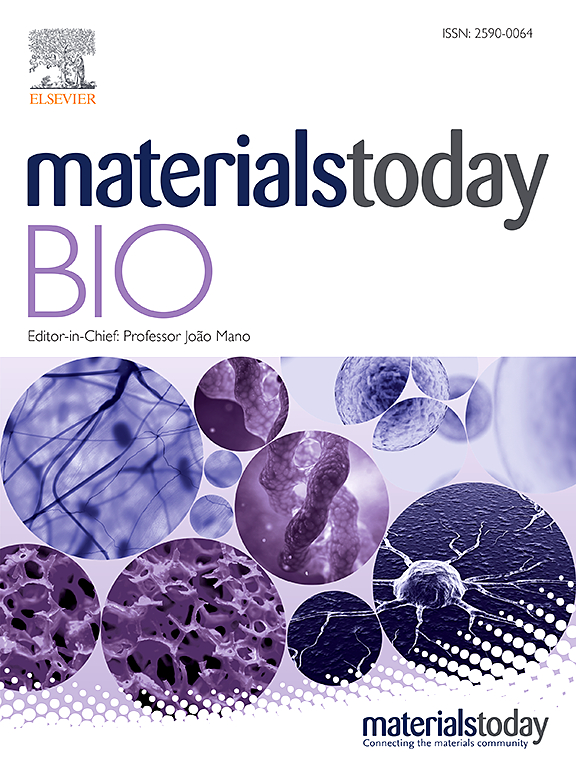A microfluidic tumor-on-chip platform deciphers hypoxia-driven FOXO3a/PD-L1 signaling in gastric cancer immunotherapy resistance
IF 8.7
1区 医学
Q1 ENGINEERING, BIOMEDICAL
引用次数: 0
Abstract
Hypoxia represents a common feature within the microenvironment of various cancerous tumors, which suppresses tumor immunogenicity. Immunotherapy, particularly based on immune checkpoint inhibitors, significantly alters the prognosis of certain tumors and reveals the presence of intrinsic or acquired resistance. Presently available platforms, however, cannot efficiently recapitulate the in vivo tumor microenvironment and elucidate the mechanisms of hypoxia-induced immunotherapy resistance in tumors. In this study, a microfluidic tumor-on-chip model is employed to investigate immunotherapy resistance in gastric cancer (GC) cells within a hypoxic microenvironment. Unlike traditional methods, this chip accurately and efficiently replicates the in vivo tumor hypoxic microenvironment. This microfluidic platform demonstrates the upregulation of the forkhead box O3 (FOXO3a) under hypoxic conditions, subsequently activating downstream programmed cell death ligand-1 (PD-L1) expression, ultimately leading to immunotherapy resistance. In a syngeneic mouse model, FOXO3a deficiency restores sensitivity to immunotherapy by enhancing immune cell enrichment. In clinical samples, FOXO3a levels and the prognosis of patients with gastric cancer receiving immunotherapy are correlated. In summary, by constructing a novel microfluidic chip, the in vivo tumor microenvironment can be efficiently simulated, uncovering the pivotal role of FOXO3a in immunotherapy resistance in gastric cancer.
微流控肿瘤芯片平台破译缺氧驱动的FOXO3a/PD-L1信号在胃癌免疫治疗耐药
缺氧是各种恶性肿瘤微环境的共同特征,它抑制肿瘤的免疫原性。免疫治疗,特别是基于免疫检查点抑制剂的免疫治疗,显著地改变了某些肿瘤的预后,并揭示了内在或获得性耐药的存在。然而,目前可用的平台无法有效地概括体内肿瘤微环境并阐明肿瘤缺氧诱导免疫治疗耐药的机制。在这项研究中,采用微流控肿瘤芯片模型来研究缺氧微环境下胃癌(GC)细胞的免疫耐药性。与传统方法不同,该芯片能够准确、高效地复制体内肿瘤缺氧微环境。该微流控平台表明,缺氧条件下叉头盒O3 (FOXO3a)上调,随后激活下游程序性细胞死亡配体-1 (PD-L1)表达,最终导致免疫治疗耐药。在同基因小鼠模型中,FOXO3a缺陷通过增强免疫细胞富集恢复对免疫治疗的敏感性。在临床样本中,FOXO3a水平与接受免疫治疗的胃癌患者的预后存在相关性。综上所述,通过构建新型微流控芯片,可以高效模拟体内肿瘤微环境,揭示FOXO3a在胃癌免疫治疗耐药中的关键作用。
本文章由计算机程序翻译,如有差异,请以英文原文为准。
求助全文
约1分钟内获得全文
求助全文
来源期刊

Materials Today Bio
Multiple-
CiteScore
8.30
自引率
4.90%
发文量
303
审稿时长
30 days
期刊介绍:
Materials Today Bio is a multidisciplinary journal that specializes in the intersection between biology and materials science, chemistry, physics, engineering, and medicine. It covers various aspects such as the design and assembly of new structures, their interaction with biological systems, functionalization, bioimaging, therapies, and diagnostics in healthcare. The journal aims to showcase the most significant advancements and discoveries in this field. As part of the Materials Today family, Materials Today Bio provides rigorous peer review, quick decision-making, and high visibility for authors. It is indexed in Scopus, PubMed Central, Emerging Sources, Citation Index (ESCI), and Directory of Open Access Journals (DOAJ).
 求助内容:
求助内容: 应助结果提醒方式:
应助结果提醒方式:


